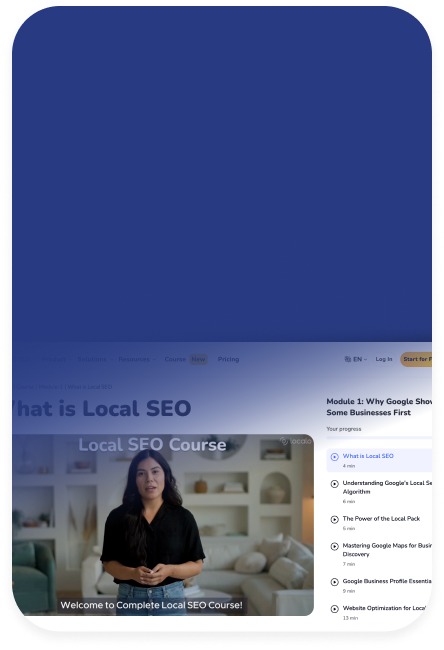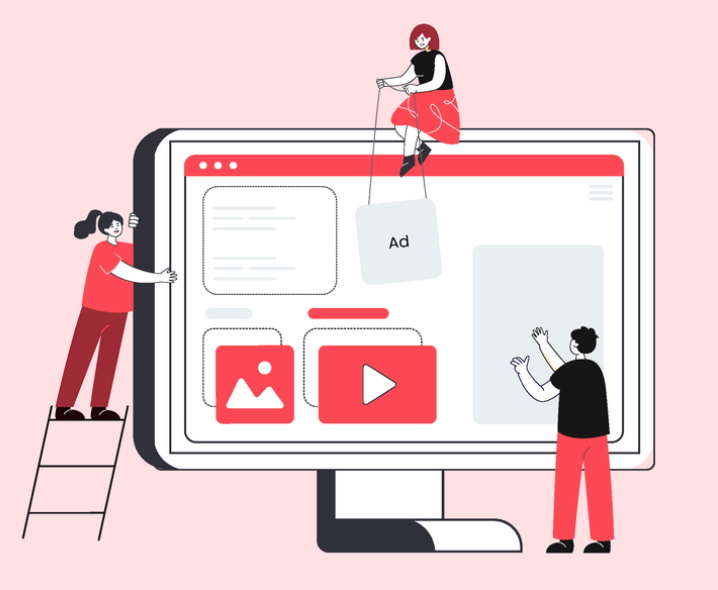
Ready to get more customers calling?
Take FREE Local SEO Course
Available now in English
Programmatic advertising - is a form of programmatic ad buying that uses automation and computer algorithms to purchase advertising space in real-time. This allows for more effective and precise targeting of audiences based on data on their behavior, preferences, location, and other demographic factors.

How does it work?
Programmatic advertising works on the Real-Time Bidding (RTB) principle, where advertising space is purchased automatically when a user loads a web page. The process takes place in milliseconds and involves analysing the user’s data, determining the value of the ad for that audience, and the advertisers placing a bid. The highest bid wins the opportunity to display the ad, which means that the ad is shown to the user who most closely matches the specified profile.
How do I implement digital advertising?
- Define your campaign objectives : define what the goals of your advertising campaign are, such as increasing brand awareness, generating leads or sales conversions.
- Choose a Demand-Side Platform (DSP): a DSP is a platform that enables ad buyers to manage multiple ad exchanges and data sources in a single interface.
- Integrate data: the effectiveness of programmatic advertising depends on the quality and quantity of data. Integrate data from different sources (CRM, web analytics, external data) to better target and personalise ads.
- Set a budget and bidding strategy: determine the campaign budget and bidding strategy that best suits your objectives. You can set a maximum CPC (cost per click) or CPM (cost per thousand impressions).
- Monitor and optimise: once your campaign is launched, monitor its performance and optimise actions in real time.
Programmatic advertising cost
Buying advertising space is variable and depends on several factors, such as targeting, competition for a given ad space, the quality and quantity of user data, budget settings, and bidding strategies. Costs can be calculated on a CPC (cost per click) or CPM (cost per thousand impressions) basis, allowing flexibility in managing the expenditure of selling advertising space. Effective use of data and optimisation of campaigns can significantly reduce costs while maintaining high advertising effectiveness.
The programmatic advertising process uses advanced technology to automatically buy and optimise ad space. It brings many benefits but also presents some challenges for companies.
Benefits of programmatic advertising campaign
- Effectiveness and precision in targeting: through the use of data, programmatic advertising allows for very precise targeting of a specific audience, which increases the effectiveness of the campaign.
- Automation and speed: the processes of buying advertising space are automated and take place in real time, allowing you to react instantly to changing market conditions and optimise your campaigns on the fly.
- Increased ROI: more effective targeting and the ability to continuously optimise contribute to an increased return on advertising investment.
- Flexibility in spending: advertisers can control spending through billing models such as CPC (cost per click) or CPM (cost per thousand impressions), adjusting budgets according to campaign effectiveness.
- Reach and scalability: programmatic advertising makes it possible to reach a wide audience across multiple platforms and devices at the same time, which contributes significantly to the effectiveness of advertising campaigns.
Challenges of programmatic ads
- Technological complexity: effective use of ad campaigns of programmatic ads requires an understanding of advanced tools and algorithms, which can be a barrier for some users.
- Transparency and control over ad placement: there is a risk of ads being placed on inappropriate sites, which can negatively impact brand image.
- Data security: the use of a large amount of personal data entails the risk of privacy breaches and requires strict compliance with data protection legislation.
- Advertising fraud: bots and fake traffic can generate false clicks and displays, leading to distorted data and wasted advertising budgets.
- Dependency on technology providers: companies often rely on external platforms and services, which can limit their control over campaigns.
Summary
Programmatic advertising work offers a dynamic and effective approach to digital media buying, enabling advertisers to reach the right audience at the right time and in the right place, significantly increasing the effectiveness of online ad sales.
![What is Programmatic Advertising - Definition [Marketing Dictionary]](/assets/img/dictionary-background.webp)
